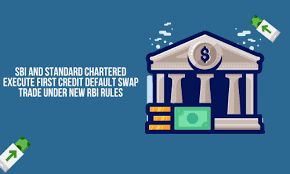Landmark CDS Trade: SBI and Standard Chartered Embrace New RBI Norms
In a significant move towards bolstering India’s financial infrastructure, State Bank of India (SBI) and Standard Chartered recently engaged in a landmark Credit Default Swap (CDS) trade, adhering to the latest norms set forth by the Reserve Bank of India (RBI). This groundbreaking transaction marks a pivotal moment in the Indian banking sector, showcasing the adoption of sophisticated risk management instruments and aligning with international best practices.
New RBI Norms: A Paradigm Shift in Risk Management The adoption of Credit Default Swaps under the new RBI norms signifies a paradigm shift in risk management strategies within the Indian banking landscape. By embracing these innovative financial instruments, banks like SBI and Standard Chartered demonstrate their commitment to mitigating credit risk and enhancing financial stability.
Implications for the Banking Sector The successful execution of the CDS trade by SBI and Standard Chartered sets a precedent for other financial institutions in India. This development not only enhances the resilience of banks against credit defaults but also fosters confidence among investors and stakeholders in the robustness of India’s banking system.

Why this News is Important:
Adoption of Advanced Risk Management Techniques The adoption of Credit Default Swaps (CDS) by leading banks such as SBI and Standard Chartered in adherence to new RBI norms marks a significant milestone in India’s financial landscape. This development underscores the importance of embracing advanced risk management techniques to strengthen the banking sector’s resilience against credit defaults.
Enhanced Financial Stability By engaging in CDS trading, banks bolster their ability to manage credit risk effectively, thereby enhancing overall financial stability. This move is crucial in safeguarding the interests of depositors, investors, and stakeholders, contributing to the stability and credibility of India’s banking system.
Historical Context:
Over the years, the Indian banking sector has undergone significant transformations, particularly in the realm of risk management. Historically, banks relied on traditional methods to assess and mitigate credit risk, often facing challenges in accurately quantifying and managing exposure to default.
However, with the liberalization of the Indian economy and the integration of domestic banks into the global financial system, there has been a growing recognition of the need for more sophisticated risk management tools. The introduction of Credit Default Swaps (CDS) represents a culmination of efforts to modernize risk management practices and align with international standards.
The global financial crisis of 2008 served as a wake-up call for regulators and financial institutions worldwide, prompting a reassessment of risk management frameworks. In response to lessons learned from the crisis, regulatory authorities, including the Reserve Bank of India (RBI), have advocated for the adoption of innovative risk mitigation tools such as CDS to enhance the resilience of the banking sector.
Against this backdrop, the recent engagement of State Bank of India (SBI) and Standard Chartered in a landmark CDS trade underscores the evolution of risk management practices within the Indian banking industry. This development reflects a strategic shift towards embracing advanced financial instruments to address credit risk effectively and ensure the stability of the financial system.
Key Takeaways from “Landmark CDS Trade: SBI and Standard Chartered Embrace New RBI Norms”:
| Serial Number | Key Takeaway |
|---|---|
| 1. | Adoption of Credit Default Swaps (CDS) signifies a paradigm shift in Indian banking risk management. |
| 2. | Participation of SBI and Standard Chartered highlights the commitment to align with global standards. |
| 3. | Implementation of CDS trading enhances resilience against credit defaults and fosters confidence. |
| 4. | CDS adoption reflects India’s integration into the international financial market and attracts investment. |
| 5. | Future outlook: CDS trading expected to revolutionize risk management practices across the banking sector. |
Important FAQs for Students from this News
Q1: What is a Credit Default Swap (CDS)?
A: A Credit Default Swap (CDS) is a financial derivative that allows investors to hedge against the risk of default on a debt obligation.
Q2: How do Credit Default Swaps (CDS) contribute to risk management in banking?
A: Credit Default Swaps enable banks to transfer credit risk to other parties, thereby enhancing their ability to manage and mitigate potential losses from defaults.
Q3: What are the benefits of adopting CDS trading for banks?
A: Adopting CDS trading allows banks to diversify risk, improve liquidity, and enhance their overall risk management framework.
Q4: What are the regulatory implications of engaging in CDS trading?
A: Banks engaging in CDS trading must comply with regulatory norms set forth by governing bodies such as the Reserve Bank of India (RBI) to ensure transparency and stability in the financial system.
Q5: How does the participation of Indian banks in CDS trading align with global financial practices?
A: The participation of Indian banks in CDS trading demonstrates their commitment to aligning with international standards and integrating into the global financial market.
Some Important Current Affairs Links

















